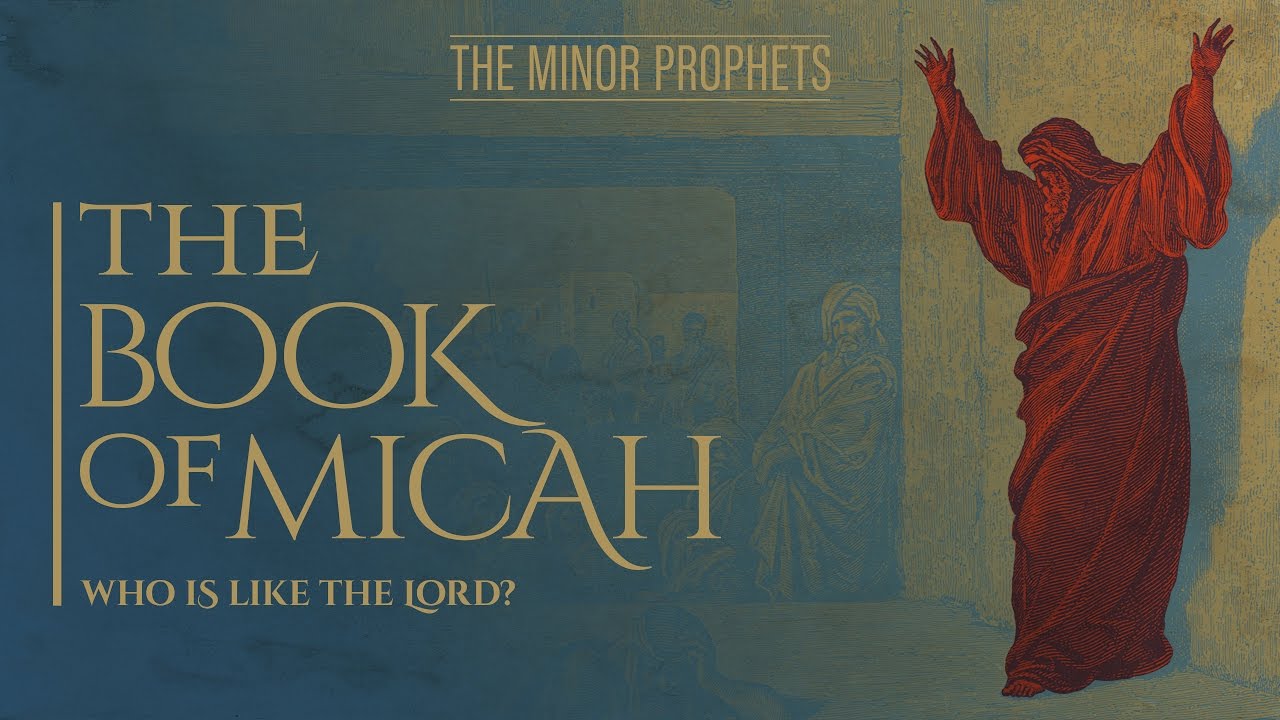מִיכָה
Micah
In the Hebrew Bible, several people are called by this name. In Jer 26:18 we find the name spelt as מִיכָיה This form looks like the pronoun "who," the preposition "like," and the noun "God" prompting the explanation that the name means, "who is like God."
However, in BHS there is a footnote that suggests a Qere, and that this form should be read as the one found in Mi 1:1 and shown above.

Used with permission. ©2021 United Church of God, an International Association. https://www.ucg.org/beyond-today/beyond-today-bible-study/the-minor-prophets
Introduction
The Book of Micah is the sixth of the twelve minor prophets in the Hebrew Bible. Ostensibly, it records the sayings of Micah, an 8th-century BCE prophet from the village of Moresheth in Judah.
Micah reproaches unjust leaders, defends the rights of the poor against the rich and powerful; while looking forward to a world at peace centered on Zion under the leadership of a new Davidic monarch. While the book is relatively short, it includes lament (1.8–16; 7.8–10), theophany (1.3–4), hymnic prayer of petition and confidence (7.14–20), and the "covenant lawsuit" (6.1–8), a distinct genre in which Yahweh (God) sues Israel for breach of contract of the Mosaic covenant.
Content
The book has three major divisions, chapters 1–2, 3–5 and 6–7, each introduced by the word "Hear," with a pattern of alternating announcements of doom and expressions of hope within each division.
At the broadest level, Micah can be divided into three roughly equal parts:
Judgment against the nations and their leaders.
Restoration of Zion (chapters 4–5, probably exilic and post-exilic, together with the next section);
God's lawsuit against Israel and expression of hope (chpts 6–7).
Within this broad three-part structure are a series of alternating oracles of judgment and promises of restoration:
1.1 Superscription
1.2–2.11 Oracles of judgment
2.12–13 Oracles of restoration
3.1–12 Oracles of judgment
4.1–5.15 Oracles of restoration
6.1–7.6 Oracles of judgment
7.7–20 Oracles of restoration
Date
Some, but not all, scholars accept that only chapters 1–3 contain material from the late 8th century prophet Micah. The latest material comes from the post-Exilic period after the Temple was rebuilt in 515 BCE, so that the early 5th century BCE seems to be the period when the book was completed.
The rest of this comprehensive Wikipedia article on the book can be read here.
An extract from BHFA Volume 5
Micah 1:16b
הַרְחִבִי קָרְחָתֵךְ כַּנֶּשֶׁר
like a vulture your baldness enlarge
KJB make yourselves as bald as an eagle,
NASB Extend your baldness like the eagle,
ESV make yourselves as bald as the eagle,
NLT Make yourselves as bald as a vulture,
NIV make yourself as bald as the vulture,
הַרְחִבִי
Hiph'il imp. f. sg. of the verb רָחַב meaning, "to be / grow wide or large."In the hiph'il binyan it then means, "cause to be/grow large = enlarge."
קָרְחָתֵךְ
Noun, f. sg. + suffix 2fs meaning, "your baldness, your bald spot (made as a sign of mourning)."
"A characteristic for which vultures are well known is their almost bare heads and necks, which is covered with short, sparse, downy-like feathers only. This was probably acquired during their evolution as a result of their carrion-feeding habit of reaching deep into carcasses."(1)
כַּנֶּשֶׁר
"The Hebrew word נֶּשֶׁר is most commonly translated as “eagle”, but this is as mucha generic term as the English. As many of the references are used figuratively, it does not give many clues as to the specific species, and could include any large raptor."(2) In this case a vulture.
(1) Hattingh, Tian (2012), Birds and Bibles in History. London Press, p. 106.
(2) Hattingh, Tian (2012), Birds and Bibles in History. London Press, p. 104.